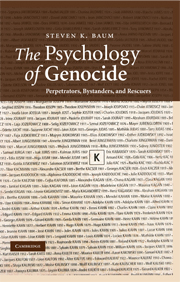4 - Bystanders
Published online by Cambridge University Press: 05 June 2012
Summary
The diligent executors of inhuman orders were not born torturers, they were not, with few exceptions, monsters – they were ordinary men.
Primo LeviCan we explain bystander mindsets and actions? How much of bystander behavior is trait and how much is situationally based? Or, are there personality dispositions involved in being bystanders? Why do the vast majority of persons do nothing at times? The key question regarding bystanders is this: who becomes what kind of bystander and why and how do they differ from their perpetrator and rescuer counterparts?
DEFINING BYSTANDERS
A bystander is generally one who is present but refrains from involvement. Yet there is an active component to bystanders – they can temporarily perpetrate or at times rescue. With fewer dependency traits than perpetrators or rescuers, bystanders are vulnerable to social norms, and make choices of action as the situation dictates.
Conformity to cultural norms co-opts much of who they are. Social roles and social status are very important to the bystander, whose primary identity is social. Traditionally religious, though not extreme, politically conservative, and at times even liberal, the Tier II group is defined by its moderate stance between perpetrators and rescuers. Bystanders employ more sophisticated defenses and thinking compared to perpetrators.
The percentage of bystanders within a population may be between 50 and 65. Within Tier II there is a range of differences as well. No two bystanders are alike.
- Type
- Chapter
- Information
- The Psychology of GenocidePerpetrators, Bystanders, and Rescuers, pp. 153 - 180Publisher: Cambridge University PressPrint publication year: 2008



